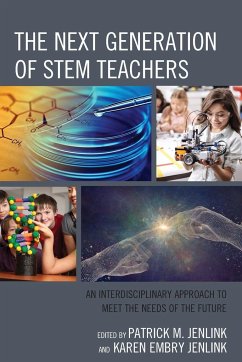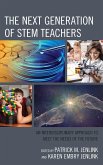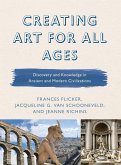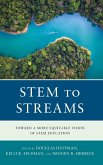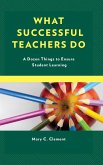Next Generation of STEM Teachers
An Interdisciplinary Approach to Meet the Needs of the Future
Herausgeber: Jenlink, Patrick M.; Embry Jenlink, Karen
Next Generation of STEM Teachers
An Interdisciplinary Approach to Meet the Needs of the Future
Herausgeber: Jenlink, Patrick M.; Embry Jenlink, Karen
- Broschiertes Buch
- Merkliste
- Auf die Merkliste
- Bewerten Bewerten
- Teilen
- Produkt teilen
- Produkterinnerung
- Produkterinnerung
STEM Teaching: An Interdisciplinary Approach breaks from the more historical idea of making knowledge within disciplines and seeks to engage the reader in a growing conversation that is gaining momentum and is focused on an 'interdisciplinarity of STEM education', which seeks to embrace and/or present emerging perspectives on the standards.
Andere Kunden interessierten sich auch für
![Next Generation of STEM Teachers Next Generation of STEM Teachers]() Next Generation of STEM Teachers92,99 €
Next Generation of STEM Teachers92,99 €![Creating Art for All Ages Creating Art for All Ages]() Frances FlickerCreating Art for All Ages112,99 €
Frances FlickerCreating Art for All Ages112,99 €![Creating Art for All Ages Creating Art for All Ages]() Frances FlickerCreating Art for All Ages61,99 €
Frances FlickerCreating Art for All Ages61,99 €![Creating Art for All Ages Creating Art for All Ages]() Frances FlickerCreating Art for All Ages58,99 €
Frances FlickerCreating Art for All Ages58,99 €![STEM to STREAMS STEM to STREAMS]() STEM to STREAMS78,99 €
STEM to STREAMS78,99 €![Creating Art for All Ages Creating Art for All Ages]() Frances FlickerCreating Art for All Ages112,99 €
Frances FlickerCreating Art for All Ages112,99 €![What Successful Teachers Do What Successful Teachers Do]() Mary C. ClementWhat Successful Teachers Do75,99 €
Mary C. ClementWhat Successful Teachers Do75,99 €-
-
-
STEM Teaching: An Interdisciplinary Approach breaks from the more historical idea of making knowledge within disciplines and seeks to engage the reader in a growing conversation that is gaining momentum and is focused on an 'interdisciplinarity of STEM education', which seeks to embrace and/or present emerging perspectives on the standards.
Produktdetails
- Produktdetails
- Verlag: Rowman & Littlefield Publishers
- Seitenzahl: 188
- Erscheinungstermin: 13. April 2019
- Englisch
- Abmessung: 229mm x 152mm x 10mm
- Gewicht: 282g
- ISBN-13: 9781475822755
- ISBN-10: 1475822758
- Artikelnr.: 54613306
- Herstellerkennzeichnung
- Libri GmbH
- Europaallee 1
- 36244 Bad Hersfeld
- gpsr@libri.de
- Verlag: Rowman & Littlefield Publishers
- Seitenzahl: 188
- Erscheinungstermin: 13. April 2019
- Englisch
- Abmessung: 229mm x 152mm x 10mm
- Gewicht: 282g
- ISBN-13: 9781475822755
- ISBN-10: 1475822758
- Artikelnr.: 54613306
- Herstellerkennzeichnung
- Libri GmbH
- Europaallee 1
- 36244 Bad Hersfeld
- gpsr@libri.de
Patrick M. Jenlink is Regents Professor, the E.J. Campbell Endowed Chair: Professor of Educational Leadership, and Professor of doctoral studies in the Department of Secondary Education and Educational Leadership. His experience includes STEM teaching with emphasis in biology I & II, chemistry, physics, human anatomy and physiology and technology, as well as serving as a building administrator, school district superintendent, evaluator and research consultant on NSF funded Statewide Systemic STEM initiative in Michigan, senior researcher on funded STEM initiatives in Oklahoma with NASA and Oklahoma State University, and senior researcher for a grant funded STEM initiative in Texas, the Texas State Middle Level Mathematics Project. Karen Embry-Jenlink is a professor of doctoral studies in educational leadership at Stephen F. Austin State University in Nacogdoches, Texas. Dr. Embry-Jenlink has directed/served on several initiatives to support STEM educator preparation and educator and workforce development, including the Texas Middle Level State Mathematics Project, U.S. Integrated Workforce Standards, Texas Regional Collaboratives for Excellence in Science and Mathematics, College and Career Readiness Initiative Mathematics Faculty Collaborative, Talented Teachers For Training in Texas, and she appointed the ATE / NASA Education Commission on STEM Education in the Future.
Preface
Acknowledgements
Chapter 1 - Introduction: STEM Teacher Preparation and Practice: An
Interdisciplinary Perspective
Patrick M. Jenlink and Karen Embry Jenlink, Stephen F. Austin State
University
SECTION ONE: Interdisciplinary Thinking and Place-Based Practices in STEM
Education
Chapter 2: Toward an Eccentric Educational Ideal: The Demands for
Interdisciplinary Thinking and Collaboration
Shawn Vecellio, The National Hispanic University
Chapter 3: Looking Deeper through the STEM Lens: Exploring the Intersection
between Content and Context to Optimize Learning
Louis S. Nadelson and Anne Seifert, Boise State University
Chapter 4: "I Don't Know Anything About DNA. Well I Do, But Not From You
Guys": A Vision for Interdisciplinary STEM Teaching
Vanessa Svihla, Kersti Tyson, Justin Boyle, Jamie Collins, Ara Kooser,
Ayesha Livingston, Abigail Stiles, and Julie Bryant
Chapter 5: Mathematics, Science, and Technology Reform in Teacher
Education: Implications for Teaching Practice
Deborah Moore-Russo and Naemi Waight
SECTION TWO: Complexities and Challenges in STEM Education
Chapter 6: Developing a STEM Education Teacher Preparation Program to help
Increase STEM Literacy amongst Preservice Teachers
Margaret Mohr-Schroeder, Christa Jackson, D. Craig Schroeder, and Jennifer
Wilhelm, University of Kentucky, Fayette County Public Schools
Chapter 7: Troubling STEM: Making a Case for An Ethics/STEM Partnership
Astrid Steele, Nipissing University
Chapter 8: Literacy-Rich STEM Project Based Learning: Preparing STEM
Teachers for High Needs Schools
Kevin Carr, Pacific University College of Education
Chapter 9: Promoting an Interdisciplinary Approach to STEM Education:
Matching STEM Pedagogy to Trends on the Demand-Side
Joseph Mukuni
Chapter 10: Epilogue: The Future of STEM Teaching
Karen Embry Jenlink and Patrick M. Jenlink, Stephen F. Austin State
University
About the Editors
About the Contributors
Acknowledgements
Chapter 1 - Introduction: STEM Teacher Preparation and Practice: An
Interdisciplinary Perspective
Patrick M. Jenlink and Karen Embry Jenlink, Stephen F. Austin State
University
SECTION ONE: Interdisciplinary Thinking and Place-Based Practices in STEM
Education
Chapter 2: Toward an Eccentric Educational Ideal: The Demands for
Interdisciplinary Thinking and Collaboration
Shawn Vecellio, The National Hispanic University
Chapter 3: Looking Deeper through the STEM Lens: Exploring the Intersection
between Content and Context to Optimize Learning
Louis S. Nadelson and Anne Seifert, Boise State University
Chapter 4: "I Don't Know Anything About DNA. Well I Do, But Not From You
Guys": A Vision for Interdisciplinary STEM Teaching
Vanessa Svihla, Kersti Tyson, Justin Boyle, Jamie Collins, Ara Kooser,
Ayesha Livingston, Abigail Stiles, and Julie Bryant
Chapter 5: Mathematics, Science, and Technology Reform in Teacher
Education: Implications for Teaching Practice
Deborah Moore-Russo and Naemi Waight
SECTION TWO: Complexities and Challenges in STEM Education
Chapter 6: Developing a STEM Education Teacher Preparation Program to help
Increase STEM Literacy amongst Preservice Teachers
Margaret Mohr-Schroeder, Christa Jackson, D. Craig Schroeder, and Jennifer
Wilhelm, University of Kentucky, Fayette County Public Schools
Chapter 7: Troubling STEM: Making a Case for An Ethics/STEM Partnership
Astrid Steele, Nipissing University
Chapter 8: Literacy-Rich STEM Project Based Learning: Preparing STEM
Teachers for High Needs Schools
Kevin Carr, Pacific University College of Education
Chapter 9: Promoting an Interdisciplinary Approach to STEM Education:
Matching STEM Pedagogy to Trends on the Demand-Side
Joseph Mukuni
Chapter 10: Epilogue: The Future of STEM Teaching
Karen Embry Jenlink and Patrick M. Jenlink, Stephen F. Austin State
University
About the Editors
About the Contributors
Preface
Acknowledgements
Chapter 1 - Introduction: STEM Teacher Preparation and Practice: An
Interdisciplinary Perspective
Patrick M. Jenlink and Karen Embry Jenlink, Stephen F. Austin State
University
SECTION ONE: Interdisciplinary Thinking and Place-Based Practices in STEM
Education
Chapter 2: Toward an Eccentric Educational Ideal: The Demands for
Interdisciplinary Thinking and Collaboration
Shawn Vecellio, The National Hispanic University
Chapter 3: Looking Deeper through the STEM Lens: Exploring the Intersection
between Content and Context to Optimize Learning
Louis S. Nadelson and Anne Seifert, Boise State University
Chapter 4: "I Don't Know Anything About DNA. Well I Do, But Not From You
Guys": A Vision for Interdisciplinary STEM Teaching
Vanessa Svihla, Kersti Tyson, Justin Boyle, Jamie Collins, Ara Kooser,
Ayesha Livingston, Abigail Stiles, and Julie Bryant
Chapter 5: Mathematics, Science, and Technology Reform in Teacher
Education: Implications for Teaching Practice
Deborah Moore-Russo and Naemi Waight
SECTION TWO: Complexities and Challenges in STEM Education
Chapter 6: Developing a STEM Education Teacher Preparation Program to help
Increase STEM Literacy amongst Preservice Teachers
Margaret Mohr-Schroeder, Christa Jackson, D. Craig Schroeder, and Jennifer
Wilhelm, University of Kentucky, Fayette County Public Schools
Chapter 7: Troubling STEM: Making a Case for An Ethics/STEM Partnership
Astrid Steele, Nipissing University
Chapter 8: Literacy-Rich STEM Project Based Learning: Preparing STEM
Teachers for High Needs Schools
Kevin Carr, Pacific University College of Education
Chapter 9: Promoting an Interdisciplinary Approach to STEM Education:
Matching STEM Pedagogy to Trends on the Demand-Side
Joseph Mukuni
Chapter 10: Epilogue: The Future of STEM Teaching
Karen Embry Jenlink and Patrick M. Jenlink, Stephen F. Austin State
University
About the Editors
About the Contributors
Acknowledgements
Chapter 1 - Introduction: STEM Teacher Preparation and Practice: An
Interdisciplinary Perspective
Patrick M. Jenlink and Karen Embry Jenlink, Stephen F. Austin State
University
SECTION ONE: Interdisciplinary Thinking and Place-Based Practices in STEM
Education
Chapter 2: Toward an Eccentric Educational Ideal: The Demands for
Interdisciplinary Thinking and Collaboration
Shawn Vecellio, The National Hispanic University
Chapter 3: Looking Deeper through the STEM Lens: Exploring the Intersection
between Content and Context to Optimize Learning
Louis S. Nadelson and Anne Seifert, Boise State University
Chapter 4: "I Don't Know Anything About DNA. Well I Do, But Not From You
Guys": A Vision for Interdisciplinary STEM Teaching
Vanessa Svihla, Kersti Tyson, Justin Boyle, Jamie Collins, Ara Kooser,
Ayesha Livingston, Abigail Stiles, and Julie Bryant
Chapter 5: Mathematics, Science, and Technology Reform in Teacher
Education: Implications for Teaching Practice
Deborah Moore-Russo and Naemi Waight
SECTION TWO: Complexities and Challenges in STEM Education
Chapter 6: Developing a STEM Education Teacher Preparation Program to help
Increase STEM Literacy amongst Preservice Teachers
Margaret Mohr-Schroeder, Christa Jackson, D. Craig Schroeder, and Jennifer
Wilhelm, University of Kentucky, Fayette County Public Schools
Chapter 7: Troubling STEM: Making a Case for An Ethics/STEM Partnership
Astrid Steele, Nipissing University
Chapter 8: Literacy-Rich STEM Project Based Learning: Preparing STEM
Teachers for High Needs Schools
Kevin Carr, Pacific University College of Education
Chapter 9: Promoting an Interdisciplinary Approach to STEM Education:
Matching STEM Pedagogy to Trends on the Demand-Side
Joseph Mukuni
Chapter 10: Epilogue: The Future of STEM Teaching
Karen Embry Jenlink and Patrick M. Jenlink, Stephen F. Austin State
University
About the Editors
About the Contributors

